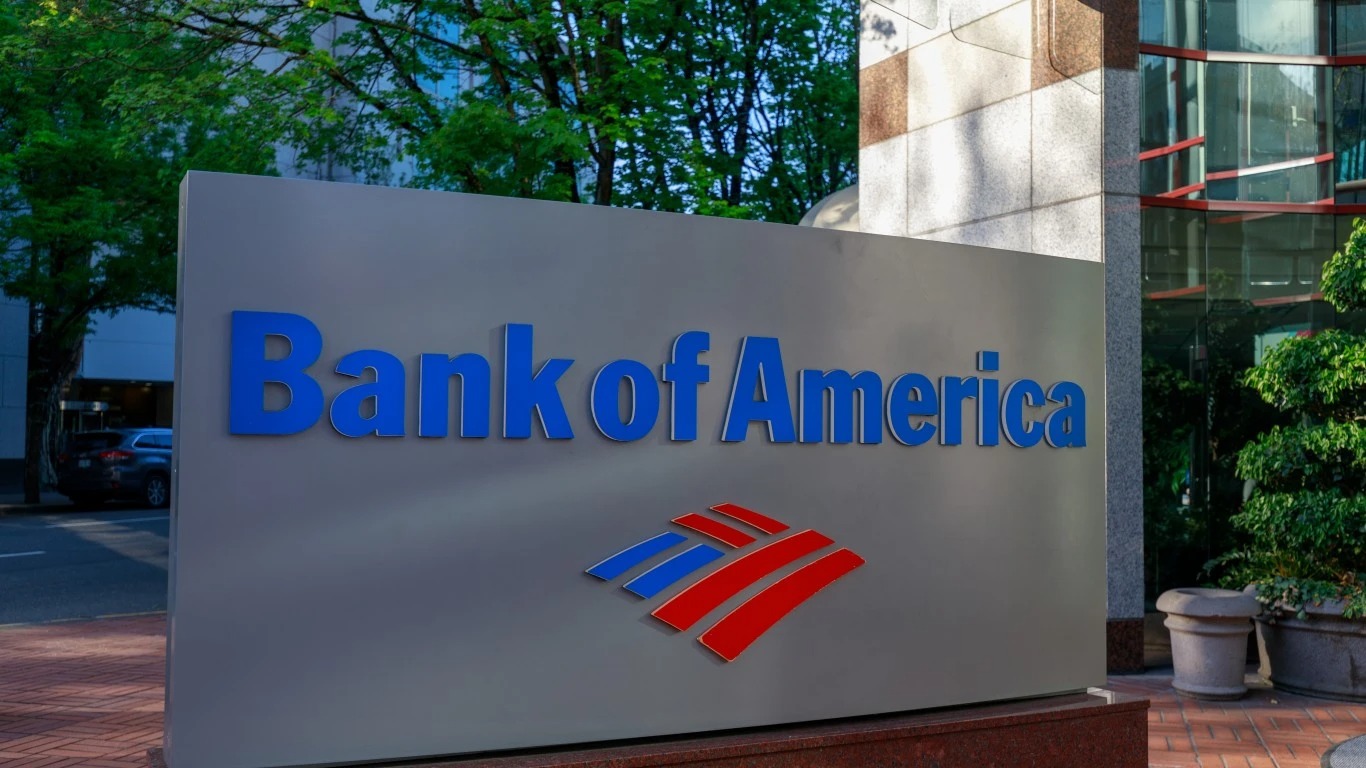
The coming week promises the release of dozens of earnings reports from a variety of sectors: banks, miners, health care and airlines. The most anticipated is Tesla’s Thursday afternoon report. Tesla is the most widely held stock among retail investors and always generates a lot of coverage.
Friday Morning’s Key Reports
Before U.S. markets opened on Friday, BlackRock reported earnings per share (EPS) of $10.91, almost 31% higher than the consensus estimate. Revenue was up 4.9% year over year but missed the consensus estimate by less than $1 million. Assets under management rose by $1.1 trillion year over year. Shares traded down about 0.7% early on Friday.
Citigroup reported EPS and revenue above analysts’ expectations. Revenue rose 8.8% year over year, but EPS came in 18% below last year’s profit. Shares traded up about 2.8% about half an hour after regular trading commenced on Friday.
JPMorgan Chase reported a revenue jump of more than 24% year over year and EPS that beat the consensus estimate by 9.6%. Net charge-offs roughly doubled year over year to $1.5 billion, but a reserve release of $113 million removed some of the sting. Shares traded up more than 4%.
UnitedHealth Group beat consensus estimates for both EPS and revenue. The health care giant also guided full-year EPS to a range of $24.85 to $25.00, above the consensus estimate. The stock traded up 2.2% early Friday.
Wells Fargo also beat estimates on the top and bottom lines. EPS were slightly lower than a year ago but beat the consensus estimate by more than 12%. Revenue rose 6.6% year over year. Shares gained 3.2% Friday morning.
Coming Up
Before U.S. markets open on Monday, Charles Schwab is expected to report earnings.
No notable reports are due out later on Monday. Here is a look at five notable reports on the earnings calendar for Tuesday morning.
Albertsons
Since announcing a merger with Kroger a year ago, Albertsons Companies Inc. (NYSE: ACI) has seen its share price fall by almost 12%. A report in Bloomberg Law from earlier this week casts doubt on whether the deal will go down. California’s attorney general is set to block Kroger’s acquisition of Albertsons. In his view, “Right now, there’s not a lot of reason not to sue.” In early September, when Kroger reported quarterly results, the companies announced that they had reached a deal to divest more than 400 stores. That appears to be insufficient for California’s AG.
Of 19 analysts covering the company, 12 have Hold ratings and the rest have a Buy or Strong Buy rating. At a recent price of almost $23.00 a share, the implied gain based on a median price target of $25.00 is 8.9%. At the high target of $25.00, the potential upside is 21.7%.
Fiscal 2024 second-quarter revenue is forecast at $18.29 billion, which would be down 23.9% sequentially but 2.1% higher year over year. Adjusted EPS are tabbed at $0.56, down 39.5% sequentially and by 22.2% year over year. For the full fiscal year ending in February, Albertsons is expected to post EPS of $2.78, down 17.6%, on sales of $79.38 billion, up by 2.2%. If the deal with Kroger does close as planned early next year, these numbers are essentially meaningless.
Albertsons stock trades at 8.2 times expected 2024 EPS, 8.1 times estimated 2025 earnings of $2.79 and 7.7 times estimated 2026 earnings of $2.94 per share. Its 52-week trading range is $19.14 to $29.19. Albertson’s pays an annual dividend of $0.48 (yield of 2.11%). Total shareholder return for the past year was 20.64%.
Bank of America
Shares of Bank of America Corp. (NYSE: BAC) have dropped by nearly 10% over the past 12 months. In the past month, the stock is down by more than 8%. Like the other big U.S. banks, rising interest rates are pounding BofA’s bond portfolio. The bank’s potential loss in the third quarter could reach $15 billion, according to Barron’s. BofA’s “held-to-maturity” portfolio of mostly agency mortgage securities has already dropped $105.8 billion in the first half of the year.
Analysts remain moderately bullish on the stock, with 13 of 25 having a Buy or Strong Buy rating. Of the rest, 10 have Hold ratings. At a share price of around $27.00, the implied gain based on a median price target of $33.00 is 22.2%. At the high price target of $48.00, the implied upside is about 78%.
Third-quarter revenue is forecast at $25.07 billion, down 0.5% sequentially but up 2.3% year over year. Analysts anticipate adjusted EPS of $0.82, down 7.2% sequentially and up by a penny year over year. For the full 2023 fiscal year, analysts forecast EPS at $3.38, up 6%, on revenue of $100.76 billion, up about 6.1%.
The stock trades at 8.0 times expected 2023 EPS, 8.3 times estimated 2024 earnings of $3.26 and 8.0 times estimated 2025 earnings of $3.38 per share. The 52-week trading range is $25.46 to $38.60. BofA pays an annual dividend of $0.88 (yield of 3.57%). Total shareholder return for the past 12 months was negative 7.30%.
Goldman Sachs
Shares of the Goldman Sachs Group Inc. (NYSE: GS) are up nearly 5% over the past 12 months. The less good news is that the stock is down nearly 10% so far in 2023.
While the Federal Reserve’s higher-for-longer interest rate policy is good news for net interest income, at the same time, the policy raises funding costs for loans and unrealized losses in bond portfolios. Goldman wants to sell its GreenSky business and will do so only at a substantial loss. The bank has already written off $504 million of the $1.7 billion acquisition cost. Its attempt to move into the consumer banking business has flopped.
Of the 25 analysts covering the firm, 15 have a rating of Buy or Strong Buy, and the other 10 have Hold ratings. At a share price of around $312.00, the upside potential based on a median price target of $382.00 is 22.4%. At the high price target of $450.00, the implied upside is 44.2%.
Third-quarter revenue is forecast to come in at $11.13 billion, up 2.2% sequentially and a drop of 7% year over year. Adjusted EPS are pegged at $5.54, up 80% sequentially but 32.8% lower year over year. The current estimates for the 2023 fiscal year call for revenue of $45.56 billion, down 3.8%, and EPS of $24.29, down 19.2%.
The stock trades at 12.9 times expected 2023 EPS, 9.1 times estimated 2024 earnings of $34.61 and 8.0 times estimated 2025 earnings of $39.38 per share. The 52-week trading range is $287.75 to $389.58. Goldman Sachs pays an annual dividend of $10.00 (yield of 3.50%). Total shareholder return for the past 12 months was 9.57%.
Johnson & Johnson
Over the past 12 months, pharmaceuticals giant and Dow Jones industrial average component Johnson & Johnson (NYSE: JNJ) has dropped about 4.5% from its share price.
After spinning off its over-the-count drug and personal care business into Kenvue, the company said it would maintain its quarterly $1.19 dividend. Since Kenvue’s IPO, its shares have dropped by more than 23%. In August, Johnson & Johnson failed in a second attempt to shove all its $8.9 billion in talc-related liabilities into the bankruptcy filing by its LTL Management subsidiary.
Of 23 brokerages covering the stock, nine have Buy or Strong Buy ratings, while 13 more rate the shares at Hold. At a trading price of around $157.00, the upside potential based on a median price target of $179.50 is about 14.3%. At the high target of $215.00, the upside potential is 36.9%.
Third-quarter revenue is forecast at $21.06 billion, down 17.5% sequentially and by 11.5% year over year. Adjusted EPS are expected to come in at $2.52, down almost 10% sequentially and 1.2% lower year over year. For the full 2023 fiscal year, analysts expect EPS of $10.03, down 1.2%, on sales of $84.53 billion, down 11%.
The shares trade at 15.6 times expected 2023 EPS, 14.4 times estimated 2024 earnings of $10.91 and 13.9 times estimated 2025 earnings of $11.31 per share. The 52-week trading range is $150.11 to $181.04. The company pays an annual dividend of $4.58 (yield of 3.03%). Total shareholder return for the past year was negative 0.73%.
Lockheed Martin
Over the past 12 months, shares of Lockheed Martin Corp. (NYSE: LMT) have increased by 10%. In 2023, however, shares are down by slightly more.
The Hamas-Israel war has boosted the share price of all defense contractors. Lockheed added around $23 billion to its market cap last Monday, the first trading day after the attack on Israel. Defense sector stocks are nearing the defense sector’s historical average of 17 times earnings. Some analysts believe that Lockheed, the world’s largest defense contractor, is likely to see more share price appreciation.
Just six of 23 brokerages covering the company have a Buy or Strong Buy rating on the stock. Meanwhile, 16 have rated it at Hold. At a share price of around $436.00, the upside potential based on a median price target of $495.00 is 13.5%. At the high price target of $555.00, the upside potential is 27.3%. The high price target has dropped by nearly $200.00 per share since the end of the first quarter.
Third-quarter revenue is forecast at $16.71 billion, up 0.12% sequentially and by 0.8% year over year. Adjusted EPS are expected to come in at $6.62, down 1.7% sequentially and by 3.6% year over year. For the full 2023 fiscal year, Lockheed is expected to post EPS of $27.10, down 0.5%, on sales of $66.64 billion, up 1.0%.
The stock trades at 16.1 times expected 2023 EPS, 15.6 times estimated 2024 earnings of $27.95 and 15.0 times estimated 2025 earnings of $28.98 per share. The 52-week range is $38.10 to $508.10, and Lockheed pays an annual dividend of $11.80 (yield of 2.76%). Total shareholder return over the past 12 months was 12.43%.
Originally published at 24/7 Wall St.
Sponsored: Find a Qualified Financial Advisor
Finding a qualified financial advisor doesn’t have to be hard. SmartAsset’s free tool matches you with up to 3 fiduciary financial advisors in your area in 5 minutes. Each advisor has been vetted by SmartAsset and is held to a fiduciary standard to act in your best interests. If you’re ready to be matched with local advisors that can help you achieve your financial goals, get started now.






